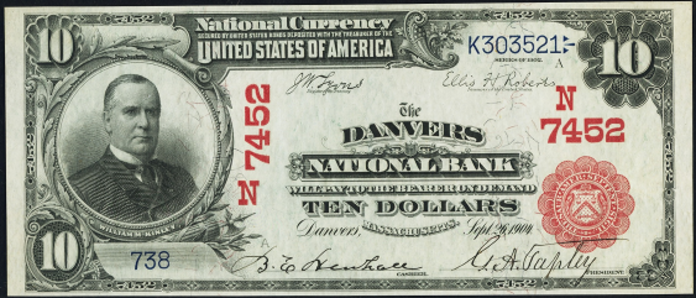Ten Dollar Notes › Nationals › 1902 Ten Dollar National Bank Notes › Pennsylvania Charters › 1902 $10 Mauch Chunk Pennsylvania Mauch Chunk National Bank
Get Value Now
| Item | Info |
|---|---|
| Series | 1902 |
| Charter | #6534 Mauch Chunk National Bank of Mauch Chunk, Pennsylvania |
| Year Chartered | 1902, 492 Banks Chartered |
| City Info | Jim Thorpe is a borough and the county seat of Carbon County in the U.S. state of Pennsylvania. The population was 4,781 at the 2010 census. The town has been called the "Switzerland of America" due to the picturesque scenery, mountainous location, and architecture; as well as the "Gateway to the Poconos." It is in eastern Pennsylvania about 80 miles north of Philadelphia and 100 miles west of New York City. This town is also historically known as the burial site for the body of Native American sports legend Jim Thorpe. Source: Wikipedia |
| Similar Cities | If your note doesn't match try: 1. Mauch Chunk, Pennsylvania - First National Bank 2. Mauch Chunk, Pennsylvania - Second National Bank 3. Mauch Chunk, Pennsylvania - Linderman National Bank 4. East Mauch Chunk, Pennsylvania - Citizens' National Bank |
| Seal Varieties | Red, Blue |
| See Also | If your note doesn't match try: 1. 1907 $10 Gold Certificate 2. 1901 $10 Legal Tender 3. 1908 $10 Silver Certificates |
| Other Info | 1. Value depends on notes known for charter, condition and market demand. |
| Neat Fact | Engraved date is when bank was organized, a 20 or 40 year anniverary of its organization, or date of title change (Kelly, 5th Ed. P 5 & Huntoon 1995). |
No Obligations Offers and Appraisals
Please submit a good photo or scan. It will be identified and evaluated. Understand there may be subtle differences between the image you see above and your note. Signatures, design, markings and note condition will determine the offer price. Notes in Uncirculated or better condition receive the best offers.
Appraisals can be estimated for wholesale and retail prices. Wholesale is what dealers typically pay. Retail is what a collector might pay. Retail is slightly higher in most cases.
Please visit this page for USA Paper Money Reference. Do not treat this page as a reference guide, it is for appraisal and acquisition purposes only.
